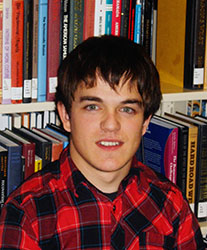Wyoming is celebrating its 125th anniversary and, as part of the programs, the state organized, on June 11 and 12, a set of conferences to take a retrospective look at the past, while also looking towards the future. Tens of researchers gathered in the town of Laramie and, amongst them, there were also David Romtvedt, Denice Wheeler, and Iker Saitua, the three of them scholars with a focus on Basque-American history.
EBB/Laramie, WY. Saitua, a PhD student from Getxo (Bizkaia, Basque Country), gave some information about his current investigation and talked about the relationship among Scot and Basque sheepherders in the mid twentieth Century, in Wyoming. “As Basques did, many Scots migrated to the US also and worked as sheepherders too; and that’s something many Basques don’t know about. There was an interclass solidarity between both groups, however, the adaptation process of the Scots was faster, because they spoke the language,” said Saitua, in conversation with EuskalKultura.com. The title of his conference was ‘Sheep Grazing in Transition: Scots and Basques in the Sheep Industry of Wyoming in the Mid-Twentieth Century.’
At the conference program organized by the state of Wyoming, Denice Wheeler’s talk's title was The Lonely Life: Basque Sheepherders in Wyoming while David Romtvedt talked about Basque Culture in Wyoming. Iker Saitua, however, presented a topic less known by the general public: the relationship amongst Basque and Scot immigrants that arrived to the West in the mid  twentieth Century. “It’s interesting since it shows the importance of the language at the time of migrating. (…) The adaptation process of the Scots was faster, because they spoke the language,” said him.
twentieth Century. “It’s interesting since it shows the importance of the language at the time of migrating. (…) The adaptation process of the Scots was faster, because they spoke the language,” said him.
In his dissertation, Saitua approached the topic of the relationship among social classes; and it is known that there is a sense of group among those who have to leave their land of origin. Nevertheless, and despite the fact that both Scots and Basques wanted to improve their social statuses, the Scots managed to do it a couple of generations before: “Basques will still be low range workers until the 60’s while Scots will shift from being employees to being employers.” “That is why the interclass relationship changes and a new economical relation emerges. Scots became ranchers and started hiring Basques, for little money.”
True facts about the American West and one lie
The West was attractive, at the beginning, for its gold and, later, for those never-ending lands to graze on. That is a rather realistic image of the West, in fact, Nevada is the state of the US with a higher percentage of public lands, where anybody could take its sheep or cows to graze−for free. That distinctive feature boosted the economy and, as Saitua thinks, it also played a role at the time of enhancing the Basque immigrants’ economic situation, at least to some extent. The situation was quite similar in Wyoming, not completely, though. And that is where the big lie lays.
As the getxotarra explains, historians don’t like when people homogenize the American West: “Nevada is a vast desert and in Wyoming, among other things, there is a lot of water.” Not only regarding the geographical characteristics but also looking at the economic history of both states, there are major differences. And it doesn’t happen just with Nevada and Wyoming, it happens with other western states too: think of California and Washington, for instance.






 twentieth Century. “It’s interesting since it shows the importance of the language at the time of migrating. (…) The adaptation process of the Scots was faster, because they spoke the language,” said him.
twentieth Century. “It’s interesting since it shows the importance of the language at the time of migrating. (…) The adaptation process of the Scots was faster, because they spoke the language,” said him. Send to a friend
Send to a friend Add comment
Add comment








